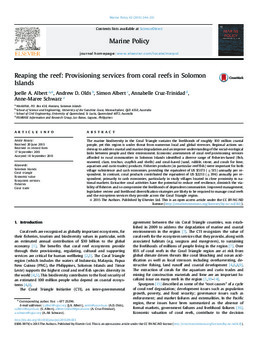Reaping the reef: Provisioning services from coral reefs in Solomon Islands

Citation
Albert, J.A. et al. (2015). Reaping the reef: Provisioning services from coral reefs in Solomon Islands. Marine Policy, 62: 244-251
Coral reefs are recognized as globally important ecosystems, for their fisheries, tourism and biodiversity values in particular, with an estimated annual contribution of $30 billion to the global economy. The benefits that coral reef ecosystems provide through their provisioning, regulating, cultural and supporting services are critical for human wellbeing. The Coral Triangle region (which includes the waters of Indonesia, Malaysia, Papua New Guinea (PNG), the Philippines, Solomon Islands and Timor Leste) supports the highest coral and reef fish species diversity in the world. The Coral Triangle Initiative (CTI), an inter-governmental agreement between the six Coral Triangle countries, was established in 2009 to address the degradation of marine and coastal environments in the region. This study was part of a Coral Triangle Initiative project on sustainable financing and payments for ecosystem services (PES) and a response to the Solomon Islands Governments interest in rationalizing existing policy on export of corals. This research was designed to fill an identified gap in understanding the economic value of provisioning ecosystem services that coral reefs provide to rural coastal people. The study focused on four case study communities selected because of contrasting socio-demographic and ecological attributes; two communities were distant and two proximate to the national market in the capital Honiara (the Honiara central market)."
Permalink
Date Available
Type
Publisher
Countries
Copyright
CC BY 4.0
Research Themes